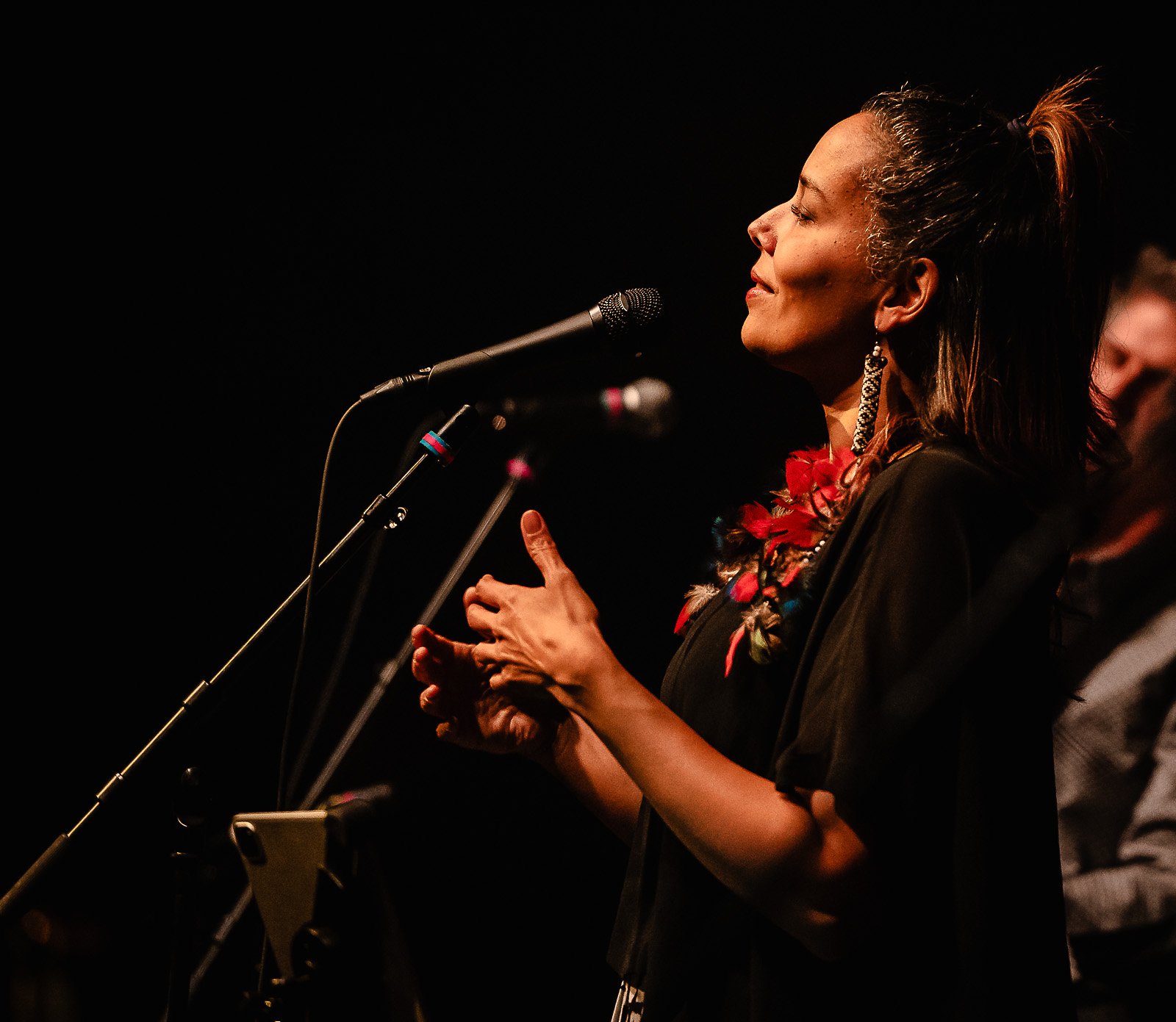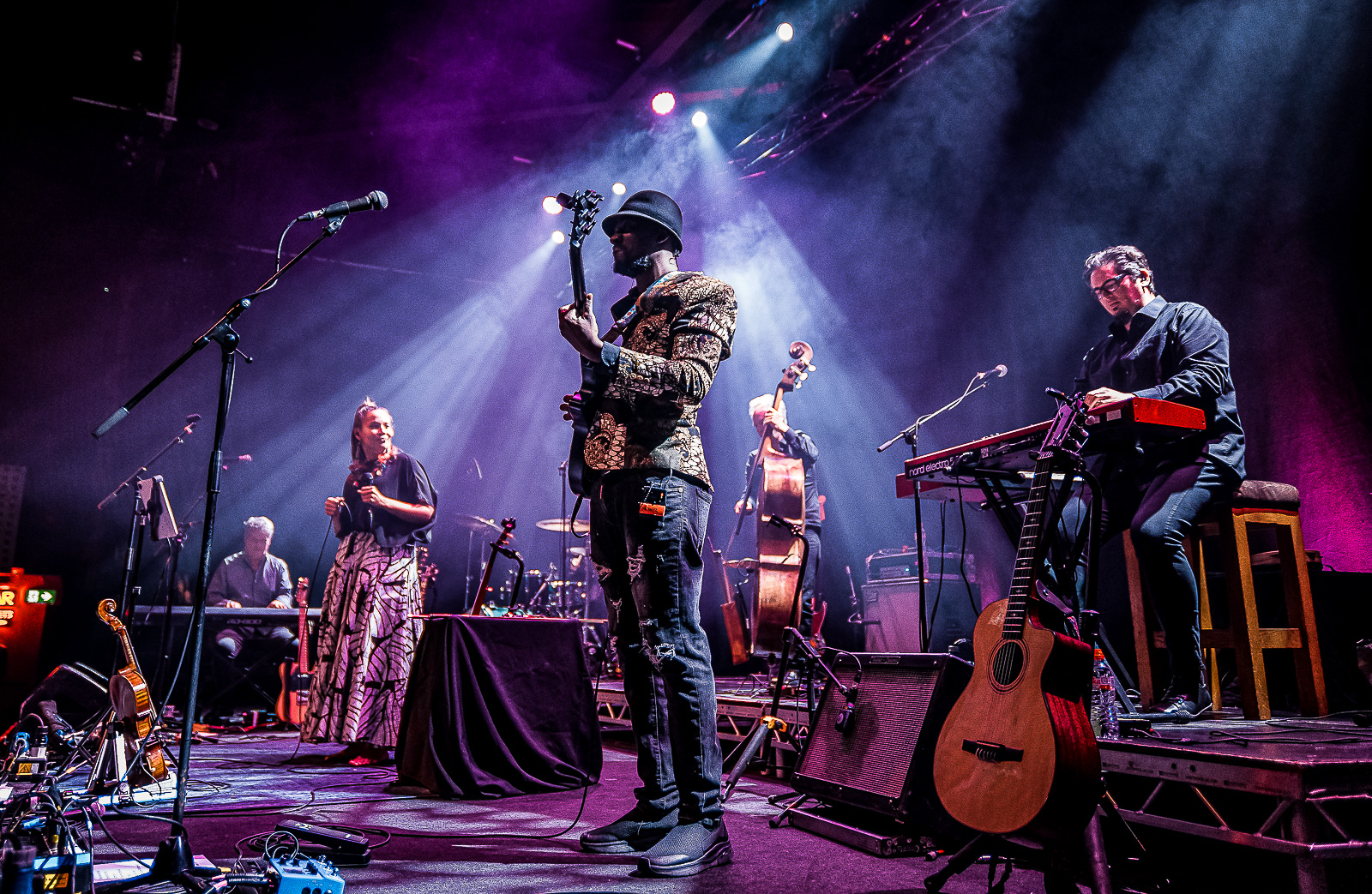- Music
- 27 Feb 24
Live Report: Rhiannon Giddens is transcendent at Vicar St

Accompanied by a razor-sharp five-piece band, Rhiannon Giddens delivered a spell-binding set — part history lesson, part musical tour de force — topped off by the artist's hypnotising vocal and instrumental presence.
Entering Vicar Street on Sunday night to see Rhiannon Giddens, you feel as if you’re being let in on a secret. The lights are dim and the space, despite the sold-out crowd, feels vast; it’s the type of empty that's full of potential energy.
With fiddles, banjos and accordions scattered about the stage, you know you’re in for a treat. Growing up near Giddens’ Appalachian hometown myself, she was widely-regarded as a bluegrass icon who pushed genre boundaries while never retreating from her roots. With her incomparable bluegrass outfit, Carolina Chocolate Drops, It was only a matter of time before Rhiannon Giddens would take over the world.
 Rhiannon Giddens onstage at Vicar St, 25/02/23
Rhiannon Giddens onstage at Vicar St, 25/02/23Playing a variety of songs off her latest album You’re the One and some old favourites, including a couple of Chocolate Drops tunes, Giddens showcased her dazzling career spanning nearly two decades.
A multi-hyphenate singer, instrumentalist and composer, Rhiannon Giddens has garnered respect and reverence across the entire industry, working with the likes of cellist Yo-Yo Ma, Ken Burns on his sweeping documentary Country Music and, most recently, playing banjo on Beyoncé’s number-1 single ‘Texas Hold ‘Em,’ an experience which she called “surreal.” Last year, she received the Pulitzer music prize for Omar, an opera based on the 1831 autobiography of Omar ibn Said, a west African scholar who was forced into slavery in the United States. She was also the recipient of a MacArthur Genius Grant in 2017, allowing her to expand her artistry.
Giddens refuses to rest on these laurels and instead employs them to continue exploring uncharted waters in her craft. A humble and endearing performer, the American singer-songwriter sauntered on stage at Vicar St, barefoot with dangling earrings made of rose vines. Here, Giddens is fierce, free and unperturbed.
 From L-R: Dirk Powell, Rhiannon Giddens, Jason Sypher and Francesco Turrisi
From L-R: Dirk Powell, Rhiannon Giddens, Jason Sypher and Francesco TurrisiIt was a family affair on Sunday night, with Giddens and her bandmembers' families in the audience, as the Americana artist – an honorary Irishwoman, following her relocation to Limerick – played to the Dublin crowd.
Accompanied by her unfathomably sharp five-piece outfit, Giddens delivered a triumphant two-hour set — part enlightening history lesson, part musical tour de force — topped off by the frontwoman’s astonishing vocal and instrumental presence on banjo and fiddle.
A scintillating tribute to a Motown icon — 'Too Little, Too Late, Too Bad' — saw Giddens genuflecting at the altar of Aretha Franklin. With jaw-dropping vocals, you’d be forgiven for thinking the ghost of Ms. Franklin possessed Giddens — who shockingly admitted to having vocal surgery in December. Her dizzying array of scats and run-on shoops — with no sign of coming up for air — followed by rapturous belting, left the audience bewildered, as such. This is all part of the artist's appeal, gathering nonplussed astonishment from audiences far and wide.
Performing songs off her latest album, Giddens’ set had stronger hints of rock and pop than before, a departure she pulled off with deftness and flare. The blending of such genres produced a soundscape equally traditional and contemporary in spirit and design.
However, what stood out is the notable enhancement in their potency. Giddens acknowledged this, expressing delight in seeing the growth of her material in live performance. Songs like ‘Wrong Kind of Right,’ ‘Hen in the Foxhouse,’ and ‘You Louisiana Man’ qwew delivered with heightened vim and vigour. Fearless in her artistry, Giddens is a risk-taker whose craft is a be-saved or be-damned baptism by total immersion and openness.
 Rhiannon Giddens
Rhiannon GiddensThe most affecting moment of the night came during ‘Another Wasted Life,’ which Giddens wrote after reading about Kalief Browder, a Black man who was wrongly incarcerated in New York without trial for years and committed suicide after failing to matriculate back into society. With many US penitentiaries run for-profit, Browder’s is one of many stories of wrongful imprisonment, mainly concerning people of colour. ‘Another Wasted Life’ sees Giddens channel her rage at the broken system with an explosive, incantatory performance that was as startlingly beautiful as it was harrowing.
That African-American tradition was a driving force behind Giddens' performance, as she laid bare the grim symmetry of American history. On ‘We Could Fly,’ Giddens excavated African folklore and a legend existing on the edge of dream and memory, about enslaved Africans who could lift up and fly home. The singer's stage presence was a vibrant, uplifting thing to behold: painstaking, layered and glowing. As she danced about the stage, barefoot and undaunted, you couldn’t help but imagine her feet lifting, slipping the bonds of the earth.
 Francesco Turrisi onstage at Vicar St, 25/02/23
Francesco Turrisi onstage at Vicar St, 25/02/23As the show drew to a close, Giddens delivered a startling a capella rendition of the English-Appalachian folk ballad 'Pretty Saro'. The audience was enrapt as Giddens demonstrated her adroit cross-pollination of genres, a sentiment which applies equally to her exceptional band. The rhythm section, consisting of Jason Sypher on bass and Attis Clopton on drums, was formidable and innovative, without overpowering the rest of the outfit. Dirk Powell triumphed on button accordion, fiddle, keys, vocals and guitar, while Francesco Turrisi astounded on keys and organ. The Congo-born, Cork-based Niwel Tsumbu garnered a speechless, awestruck reaction on several ambitious guitar riffs that warbled and rambled like birdsongs.
 Niwel Tsumbu onstage at Vicar St, 25/02/23
Niwel Tsumbu onstage at Vicar St, 25/02/23The night ended with an emphatic, soul-stirring version of Sister Rosetta Tharpe’s ‘Up Above My Head,’ that transformed the crowd into a congregation with an electrifying call and response finale. It was a powerhouse performance from Rhiannon Giddens, a sonic visionary and peerless luminary, whose tremendous voice and musical chops bridge mountains and oceans, across nations and generations.
RELATED

- Music
- 16 Dec 25
Texas singer-songwriter Joe Ely has died, aged 78

- Pics & Vids
- 11 Dec 25
Jesse Welles at 3Olympia Theatre (Photos)

- Pics & Vids
- 04 Nov 25
Maren Morris at The National Stadium
RELATED

- Music
- 31 Oct 25
Lucinda Williams announces new album and UK/Ireland shows

- Music
- 24 Oct 25
Album Review: Brandi Carlile, Returning To Myself

- Music
- 12 Sep 25
Album Review: Josh Ritter, I Believe In You, My Honeydew

- Music
- 12 Apr 25
Track of the Day: Fintan McKahey, 'Higher Place'

- Music
- 25 Mar 25


